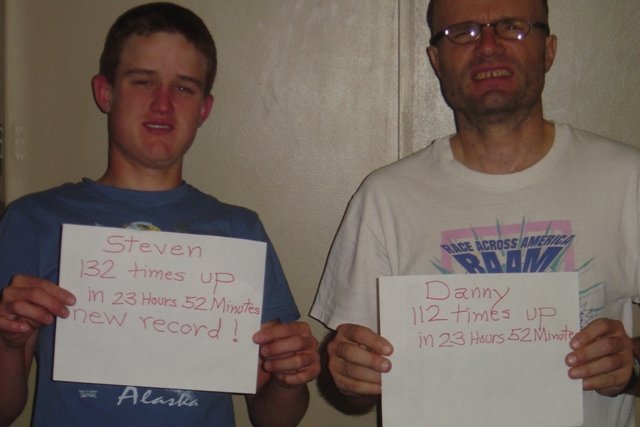 A Little Princess, by Frances Hodgson Burnett (Grosset & Dunlap, New York, 1965)
A Little Princess, by Frances Hodgson Burnett (Grosset & Dunlap, New York, 1965)
I picked this book up to re-read it because I needed an antidote to The Curious Incident of the Dog in the Night-Time. You can tell this particular copy has been in my library for a long time by the printing date above. The price on the book is 50 cents. The book itself was written in 1904, and can be found online.
Burnett's characters are as one-dimensional as most of Haddon's, and her heroine is a little too good to be completely believable. But "a man's reach should exceed his grasp, or what's a heaven for?" and the question of how much of our good behavior is merely a response to pleasant circumstances is by no means a shallow one. A friend of ours has a daughter who is very much enthralled by the Disney Princesses, an infatuation her mother wisely turns to a learning opportunity, reminding her as often as necessary that princess is as princess does. This is the theme that runs through A Little Princess, as Sara, sneeringly dubbed "princess" for her wealth and spoiled childhood, has her character tried through hardship. If the ending of The Curious Incident was unsatisfactory, that of A Little Princess is definitely contrived and coincidental—but at least it's fun. The book also wins points by making me wish to be a better person, an idea I'll return to in a subsequent post.New Year's resolutions are, I guess, a secular version of Lent, though without Easter to look forward to. I've never given much attention to this observance, but I like Lent, and I like new beginnings, so coming up with a few resolutions might be fun.
To those who know what a bookworm I am, resolving to read more books in 2010 will appear about as useful and as difficult as resolving to eat more chocolate or drink more tea. However, despite being an unemployed "empty nester," I've discovered to my shock that I'm now reading fewer books than ever before. I listen to audio books in the car as I run errands; I read blogs, articles, and news stories online; I skim magazines. I read books in five-minute gulps as I can throughout the day—on visits to the "reading room," while eating, while falling asleep at night. But I hardly ever read, i.e. concentrate on a single book for an extended period of time, which is the only way to absorb a book of any substance. I write much more than I used to, and I spend a whole lot of time researching, but to my shock it will apparently take a deliberate determination to once again be able to call myself a reader.
Adopting the management maxim, "What gets measured gets done," and stealing my sister-in-law's idea, I'm creating a page on which to document the books I read this year—see "Books Read" under Links/Personal, in the panel to the right. If I also write about them, I'll include a link to the review as well. And maybe a rating, if I'm feeling ambitious.
Permalink | Read 3431 times | Comments (3)
Category Everyday Life: [first] [previous] [next] [newest]
 The Curious Incident of the Dog in the Night-Time by Mark Haddon (Jonathan Cape, 2003)
The Curious Incident of the Dog in the Night-Time by Mark Haddon (Jonathan Cape, 2003)
As with Born to Run, I picked up this book because it was lying around and the title caught my eye. I don't recommend it, but that doesn't mean I found it easy to put down. I had intended to take the book on the airplane with me, but finished before my boarding pass was printed. The story is initially compelling and the premise unique: a murder mystery through the eyes of a teen with Asperger Syndrome. Whether the portrayal of the way someone with Asperger Syndrome might think or act is realistic or not, I can't say. But it's an interesting viewpoint, and I loved the math problem at the end (though it was somewhat poorly worded) and the fact that the chapter numbers are all prime. (More)
 Born to Run, by Christopher McDougall (Knopf, New York, 2009)
Born to Run, by Christopher McDougall (Knopf, New York, 2009)
A book about running? Not my thing. On my daily walks (where by "daily" I mean five days a week and only when I'm not on the road) I've managed to work my way up to doing a quarter of my four miles at what could charitably be called a slow jog, but there my interest ended. However, my nephew received Born to Run for Christmas, and I was curious enough to flip quickly through it.
Born to Run is a fascinating and groundbreaking book. Actually, it's at least three books, interwoven, and it's no coincidence that when I perused it I couldn't decide if it was meant to be nonfiction or a novel. (More)UPDATE: The Second Edition of Phoebe's Quilt, corrected and expanded, is now available.
 My sister-in-law found it in a trunk: an old, handmade quilt. Each block was inscribed with a name, often a city, and sometimes a Bible verse. The cities and many of the surnames were familiar, but no name was identifiable as that of someone in the family. Who were these people? Whose quilt was it, and when was it made? And how did it end up in Prudence's trunk?
My sister-in-law found it in a trunk: an old, handmade quilt. Each block was inscribed with a name, often a city, and sometimes a Bible verse. The cities and many of the surnames were familiar, but no name was identifiable as that of someone in the family. Who were these people? Whose quilt was it, and when was it made? And how did it end up in Prudence's trunk?
Far be it from me to resist a genealogical puzzle, especially when it can be turned into a Christmas present: I would use my genealogical resources to decipher the quilt, and turn my research into a book to put under the tree. Little did I know how much of my life this little project would consume; I'm certain the quilt itself was completed in less time.
Did I say completed? I doubt I've ever used that word in a genealogical context unless accompanied by "not" or "never." But Christmas will come whether or not we are ready, and thus I was saved from my perfectionist tendencies. The project is as done as it is going to get, barring a second edition. (More)
You read it here first: Steven Perezluha, who this summer rode his bicycle from Florida to Alaska and back, has blown away the record for climbing the University of Pittsburgh's Cathedral of Learning. His uncle, Danny Chew, had held the record at 101 times; that was broken earlier this month by triathlete Diana Marongiu-Lutz. I hope to have more details (and perhaps a link to a news story) later.
Steven's record-setting climb: 132 times!
UPDATE December 31, 2009
Nothing yet from the Pittsburgh papers, but Danny Chew's website has more details than you want to know and some pictures. Several other people joined them for the climb; too bad the former record holder wasn't there to defend her title.
Steven and Danny began their climb at 6:00 a.m. on December 26, and finished 23 hours and 52 minutes later at 5:52 a.m. December 27. Danny broke his own record by ascending 112 times. Steven's record-obliterating climb was a Double Everest: twice the distance from sea levelto the top of Mount Everest.
Not all sports photos show athletes looking their best. But I think I'd look this bad after being awake for 24 hours—never mind climbing Mt. Everest twice.
Photo credit: The Perezluha Family
Permalink | Read 6184 times | Comments (4)
Category Everyday Life: [first] [previous] [next] [newest]
The trouble with being a reasonably regular poster is that people start to worry when you get too busy to write. When someone in Europe asks your daughter if everything's okay because she hasn't seen you on Facebook lately...you have to start thinking maybe your online life has been a little too active. Be that as it may, herewith a few highlights. Recently we have:
- Awakened to a Winter Wonderland.
- Shovelled two and a half feet of snow.*
- Zoomed down a hill on fast sleds.
- Enjoyed hot cocoa and a toasty fire.
- Played games. Lots of games.
- Celebrated a nephew's first college acceptance letter.
- Finished (although that's a relative term) a huge genealogical Christmas present project. (To be posted here eventually.)
- Enjoyed cello, clarinet, and guitar music (though not enough).
- Listened to Bartholomew's Passage.
- Made dream cookies.
- Ate dream cookies. And kringle. And M&Ms.
- Watched A Charlie Brown Christmas.
- Stayed up too late.
- Had a wonderful time visiting friends and family.
- Sneezed. (Some of the friends and family had cats.)
- Played at the Connecticut Science Center.
- Enjoyed a few presents and a whole lot of presence.
And it's not even Christmas yet!
Permalink | Read 2830 times | Comments (4)
Category Everyday Life: [first] [previous] [next] [newest]
First, our daughter turns 30. Then over Thanksgiving I had the privilege of taking my first nephew-driven car ride (and a great job he did, too). And if that weren't enough, today another nephew received his first college acceptance letter!
Next thing you know, our grandson will be losing his first tooth. Oh, wait, that already happened....Permalink | Read 2359 times | Comments (0)
Category Everyday Life: [first] [previous] [next] [newest]
John C. Wright is a science fiction writer, but his essay, On Writer's Block struck me for its wider applicability in his assertion that even the best advice can be counterproductive if it doesn't fit the personality of the recipient. [The emphasis below is mine.]
Each writer approaches his craft in a different way, and advice from one writer to another is useful if and only if you happen to be a writer of the same method and temperament as the first.
Robert Heinlein famously used to advise would-be writers never to rewrite their first drafts, except at an editor’s suggestion. Unless you are a ditherer, that is, someone who wastes his limited writing time rewriting scenes that are already saleworthy, this advice is not useful, or indeed may be counterproductive. Heinlein was warning against the pitfalls of perfectionism. But if you are not a perfectionist, and not a ditherer, the advice is counterproductive, because writers who should rewrite are being told not to. Heinlein was a First Draft man: he could breeze off printable copy his first try. His books sold on the strength of their wittiness, readability, and speculative ideas: one strongly suspects he never went back to his first chapter to set up some plot twist he invented for the last.
If you do not write like him, merely able to breeze off finely crafted copy in your first try, then do not take his advice. Frankly, I thought this one of the worst pieces of writing advice ever, because I suffer the opposite vice. I write impromptu and I like to stick with my first instinct, and therefore I do not rewrite often enough. Hence Heinlein’s advice was the opposite of what someone like me should be told.
Every bit of writing craft advice is only good for you to the degree that it applies to your situation. In this example, Dithering Perfectionists should follow Heinlein’s advice, and never rewrite except at an editor’s suggestion. Impromptuarians should follow the opposite advice that all writing is rewriting.
The catch, of course, is that Impromptuarians are inclined to snatch at the advice best for Dithering Perfectionists, and vice versa. Back in the late 1970s and early 80s, we were frequently urged to do less driving and more walking, advice that I followed with alacrity and even a bit of pride. Alas, there was no virtue in my environmentally-correct response, since at the time getting behind the wheel of a car tended to bring on panic attacks. What I needed to do, at that particular moment, was to walk less, drive more, and conquer my phobia.
Know then thyself.Permalink | Read 2596 times | Comments (2)
Category Random Musings: [first] [previous] [next] [newest]
The Franklin Insitute, Philadelphia, Pennsylvania
I don't remember my first visit to the Franklin Institute; I believe it must have been on some visit to Philadelphia when I was very young; all I remember was walking through the heart. Later, however, we moved to the Philadelphia area, and were regular visitors. For two summers I worked in the Franklin Institute Research Labs in the building next door, and even more important to me than my paycheck was the ID badge that allowed me to take the tunnel between the buildings and spend most of my lunch hours in the museum.
After he retired, my dad became a Franklin Institute volunteer, and it was natural for him to take his grandchildren there when they came to visit. By that time, the museum had grown an addition, with new exhibits that made it look like any modern science museum, but the kids' favorite, and my own, was the old building, with its greater educational content and more detailed, written information with each exhibit. Now Dad's grandchildren have children of their own, and on our recent visit to Philadelphia we all looked forward to watching them delight in our old favorites.
The great-grandkids were happy enough, but the rest of us were somewhat disappointed. To our delight, the heart is still there, as is the train that Dad used to drive as one of his docent duties (it's easier to keep a 350-ton locomotive than to get rid of one) but the "new building" style has now infected the old building, too. Many of our favorite exhibits are gone, replaced by displays designed for shorter attention spans and lesser literacy. The math room that had kept our kids entranced for hours was nowhere to be found, and when I finally asked a docent, "Excuse me, it's been a long time since I was here last, and I can't find the math room," he replied, "It has been a long time since you've visited; they took that out years ago."
It took a bit of effort, but we did find Newton's Dream, the kinetic sculpture that so entranced Heather as a child. It's in a different place now, and has been cut down in size, but that didn't stop the children from following it with the same fascination. Also riveting was Der Lauf der Dinge, a Swiss-made movie of a 30-minute Rube Goldberg setup with lots of pyrotechnics and impressive chemical reactions. Thanks to the magic of YouTube, you, too, can see this amazing performance, albeit broken into three segments. (Here are the links as well, since I note that embedded videos don't always show up in feedreaders: Part 1, Part 2, Part 3.
Lest I be seen as a totally hopeless conservative who never likes anything new, the museum's newest exhibit, Amazing Machine, is also excellent, and we could have spent much longer playing with its cams, gears, pulley, and linkages had we not been nearing the end of our visit. (Heather: That's what I want for Christmas. You can turn a mechanical engineer into a joyful homemaker, but the engineer is still there.)
The American Museum of Natural History, New York, New York
On my first visit to the American Museum of Natural History I was probably about as young as when I first encountered the Franklin Institute, but in this case nearly half a century elapsed between visits. The AMNA, however, shows more respect for its old exhibits, and the wonderful dioramas that are all I remember from my first visit are still featured, with all their high information content and long descriptions to read. I could easily have spent the entire day among them. Porter found one, the African buffalo, that was sponsored by George Eastman, and remarked, "He sponsored the Buffalo because there is no animal named Rochester, but he should have sponsored the Kodiak bear." Yes, we're still married; I happen to like that kind of humor.
The museum has several new exhibits as well as the old, most of which were quite good. There was a bit of a "politically correct" feel in a few places, but it was not unbearable, and in general the educational value and written descriptions were sufficient. Despite my primary concern for material to read, I am also particularly sensitive to the layout of displays—color, font, background, use and placement of images and other media—and this, too, the AMNH exhibits did well.
One disappointment was the Hall of Minerals, chiefly because whoever is responsible for lighting must have been on vacation. For several months. It was dark. At first I thought the gloom was meant to provide contrast to the brilliance of the minerals and gems, but many of the lights that should have been highlighting the rocks were also out. We very nearly missed the famous Star of India because it was in the dark.
In addition to the old favorites, we signed up for several special exhibits and shows. Traveling the Silk Road was disappointing, but only because I had expected the most from it. It was well done, but crowded, with not as much information as I had hoped and not enough time in the crowd to do justice to what was there. The best part was the section on silk making and sericulture.
I believe Journey to the Stars was a better-than-average planetarium show (more information, less mindless entertainment), but unfortunately I responded the way I always do when faced with a movie or movie-like substance in a dark room, awakening only at the end.
The Butterfly Conservatory was interesting, though I think I've seen more fluttering in the butterfly garden at our own Leu Gardens.
Frogs: A Chorus of Colors was great; Heather would have loved it. Except the part where we learned about the devastation being wrought by the chytrid fungus.
The American Museum of Natural History is well worth visiting more often than every 50 years. The dioramas alone are a homeschooler's paradise.Where Bd [Batrachochytrium dendrobatidis] thrives, generally in moist cool habitats, 50% of amphibian species and 80% of individuals can be expected to disappear within one year.... Currently it cannot be stopped in the wild and a minority of species seem able to survive with a Bd infection as larvae or as adults and these animals likely serve as a reservoir and vectors for future outbreaks. Notable among resistant species are worldwide invasive pest species including marine toads, American bullfrogs and African clawed frogs.
This morning, the mp3 player that powers the perpetually random assortment of music emanating from our stereo system struck up Stacey Lynn Regan's, I Offer My Isaac. Seven years after our firstborn's firstborn made his grand entrance and agonizing departure from the stage of this world, Stacey's song still has the power to stop me mid-anything and tap into deep wells of sorrow. So do In Christ Alone, which our church programs into the service with alarming frequency, heedless of the fact that one choir member can never make it all the way through the song (breaking down at "from life's first cry to final breath" if not before), and also There Were Roses, a powerful song made all the more poignant because I first heard it, around the time of Isaac's death, in the Green Linnet version—where the name of one of the protagonists is Isaac.
Music has such strange power. These songs call forth deep sobs of agonizing grief, but it is not a miserable sorrow. There may be wounds that time cannot heal, but the lively presence of Isaac's subsequent siblings is a powerful healing agent, as is the certainty that Isaac is safe in God's keeping and we will be reunited at the right time.
Without any justification for such images, other than that he was born blond, I have a definite picture of Isaac in my mind: a cross between C. S. Lewis's Prince Caspian (from the books, not the movie) and George MacDonald's Sir Gibbie; of no particular age, blond, blue-eyed, and almost always laughing.
Here's to our firstborn grandchild, with joyful sorrow, on his birthday.Permalink | Read 2640 times | Comments (3)
Category Everyday Life: [first] [previous] [next] [newest]

 Tales of the Greek Heroes by Roger Lancelyn Green (Puffin Books, London, 2002) and The Tale of Troy by Roger Lancelyn Green (Puffin Books, London, 1994)
Tales of the Greek Heroes by Roger Lancelyn Green (Puffin Books, London, 2002) and The Tale of Troy by Roger Lancelyn Green (Puffin Books, London, 1994)
These two books are meant to be read together, with the story of Troy second.
After my very positive experiences with Green's books on Robin Hood, King Arthur, and ancient Egyptian stories, I expected too much of these two. I still recommend them; they are worth reading, and I found that within a week something I read there helped me understand a story I heard later. Nonetheless, there are drawbacks. (More)RootsMagic, my favorite genealogy database program, has released RootsMagic Essentials, a version you can download that is absolutely free! In case anyone is wondering, I don't get a thing for this endorsement; I just like RootsMagic, and I like encouraging interest in genealogy. It looks as if one can do a lot with Essentials, and it might be a great, commitment-free way to keep track of family information even if one doesn't have (yet) a desire to delve any further. Sadly, one of my favorite features, color coding of families, is not part of the stripped-down version, but—tanstaafl—if there is, sometimes, a free lunch, the full-course dinner always costs.
If any of my family members decide to download RootsMagic Essentials, I'll be happy to send along a copy of my database. :)Some things one can never tire of, like the light of understanding in a child's eyes, the leap of the space shuttle into the sky, and the magesty of animals in their natural surroundings.
As a rule, on most days I take time out for a four-mile walk/run, followed by a swim when the weather permits. My legs are short, so this usually excises an hour and a half from my day. Being a procrastinator by trade, too much of the time I find myself attempting to squeeze it in before sunset.
It doesn't help that here in Florida we do not have the long twilight that northerners enjoy, so I need to watch the clock rather than the window. I can leave home in broad daylight, and by the time I return it is dark. The halfway point is in a small, nearby park with a jogging trail through the woods, and before I finished my circuit the other day, dusk was well-settled. I prefer not to run under those conditions, since it's harder to see the potentially treacherous dips and hills in the path—but there are advantages.
Like the sudden, silent flight overhead of a huge barred owl, who obligingly paused on a tree branch long enough for me to admire it briefly.
I continued my run with a lighter step.Permalink | Read 2371 times | Comments (1)
Category Everyday Life: [first] [previous] [next] [newest]
In Forgetting the Unforgettable, I remarked on how ordinary were my diary entries when the Berlin Wall was breached. In a subsequent comment, Stephan mentioned that he barely remembers the event, despite living so close to Germany.
Soon thereafter, while taking my customary walk and listening to a history lecture on my trusty mp3 player, I was reminded that the Cuban Missile Crisis occurred when I was the age Stephan was when the Wall fell. I have no memory of the event whatsoever, nor of any particular anxiety because of the imminent threat of nuclear war. We had "air raid drills" in our elementary school, but that was nothing new; they were a normal part of school, like the equally-frequent fire drills. If the adults in my life worried about the situation, none of that filtered down to me. My life comprised surviving fifth grade, playing with my friends, and enjoying my new baby brother.
Curious, I delved into the journals that my father had kept, hoping there would be entries for October 1962, and there were. I looked forward to hearing how he and my mother had dealt with the fears that, I'm told, caused families eating breakfast to wonder if they'd still be alive at dinnertime. (More)


